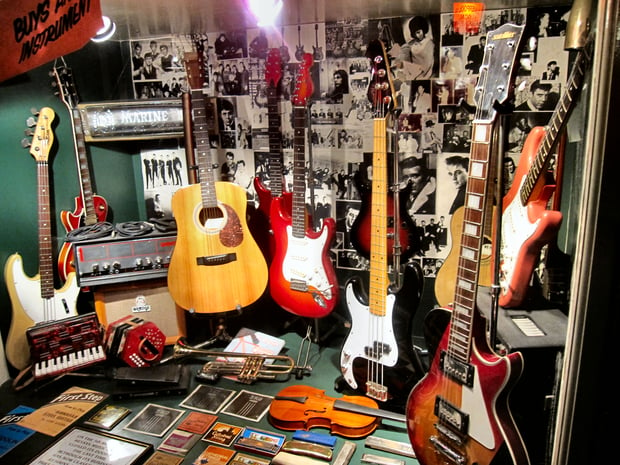 Photo by Ronald Saunders via Flickr / CC BY 2.0
Photo by Ronald Saunders via Flickr / CC BY 2.0
You saved up for months to buy this beautiful instrument. Or, alternatively, you splurged on a credit card and then lived on beans and rice for months to make the payments. Either way, you put the work in to get pro-quality tools to advance your music. Now, for whatever reason, you’re thinking about moving on – you’re thinking about selling your gear. Whether it’s because you’re trading up, changing priorities, or just feeling like you need cash, there are a few things to watch out for so you don’t walk away with regrets.
1. Be extremely sure
When it comes to selling your stuff, one thing holds true: you’ll rarely get back what you paid. Unless you have a vintage instrument, in good condition, and older than your parents, you’re going to take a loss. Even if you’re really broke, the money you get from the sale will only help you for a short time. Is there another way?
You also need to think about whether you’ll need it again later. For example, you may not be playing bass in a band right now, but that doesn’t mean you should sell your only bass. If you like it, consider keeping it. It’s a much better policy to keep equipment that sounds good and is a pleasure to use. Sell what you no longer need. Sell what you’ve replaced with something better. But if you’re thinking about parting with well-loved gear just to get some cash, consider finding a more sustainable path forward.
2. Don't trade money for time
You can always go to a music store and trade in gear. There, you’ll be confronted with the choice of accepting dimes on the dollar in trade, or pennies on the dollar for cash. Yes, it’s quick: you can walk into a music shop with a milk crate full of effects pedals and microphones and sell them all on the spot. And yes, you can negotiate. Their first offer is their first offer, and you can barter back and forth to get a better deal. But in the end, the best benefit of music store trade-ins is convenience. It’s less work for you, but you’ll pay for it by getting much less value out of your gear. That might be okay with you if you really do have a crate full of stuff you’re never going to use again. But if you want the best return, you’re better off going private sale.
3. Use the online marketplace… carefully
Marketplaces like Craigslist or eBay are an amazing resource that bring together millions of buyers and sellers every year. Placing an online ad with a couple of choice pictures is quick and easy. Set your price 20 to 30 percent higher than the price you need to get so there will be room to negotiate.
It seems like a cliché to warn people about scammers online, but these crooks steal from tons of people who should know better, and they are proliferating. You’ll know you’re dealing with a scammer when someone writes you with a very vague pitch (referring to whatever you are selling as "the item," for example), offers you more than your asking price, and then asks you to go through some sort of complex procedure, or wants to do business through the mail or by wiring money.
In general, you should deal only with local sales on Craigslist – even Craigslist says so. Meet up with people at neutral, public sites and always bring a friend when meeting a stranger. eBay is simpler, since you’ll have the money in hand before your ship the item, but there are fees involved with eBay sales and you have to deal with the hassle of shipping. Unless you’re selling something very strange or rare and need a wider marketplace, local sales are usually a better choice. After all, there are probably six people on your street who’d like to buy your old Yamaha acoustic guitar for $100.
4. Make sure buyers get what they pay for, and make sure it stays gone
You should always make clear when selling items online that you won’t accept returns. You're not a retail store, and once someone has purchased your gear, it shouldn’t come back. Letting this policy be known from the outset is helpful. Of course, this puts the onus on you to make sure your buyers are given an honest appraisal of what they’re getting, as well as a chance to inspect things to their satisfaction. For instance, if all the toms on your drum set have punctured bottom heads, let potential buyers know up front rather than showing the set in a dark room and hoping they won’t notice.
5. Explore alternatives to selling
Let’s say your main goal isn’t getting cash for old gear, it’s clearing space. If your studio is cluttered up with your old student drum set, your first solid-state combo amp, and that bass cabinet your friend Steve left at your place before moving to Phoenix seven years ago, that stuff has very little value to you. But it could have a lot of value to someone else. Check with your local school music programs, nonprofit music academies, or any program that gets kids into music. A lot of parents don’t have the money to buy their children instruments, even if those kids might have real talent.
If anybody ever gave you an instrument to learn on, consider paying it forward by donating. You can actually still get some money back on your taxes when you make donations, and you’ll know you’ve helped a kid learn to rock.
Jesse Sterling Harrison is an author, recording artist, and part-time farmer. He lives in Massachusetts with his wife, three daughters, and a herd of ducks.


